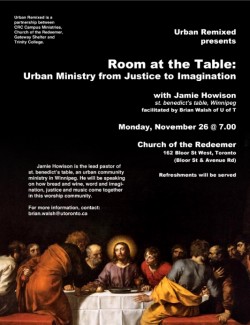Dear friends,
This week we welcome Jamie Howison as our speaker for the evening, the lead pastor of St. Benedict’s Table, a thriving urban church in Winnipeg, Manitoba. St. Benedict’s Table is a unique church community especially in its practice of an open communion table and in its honouring of the role of creativity and imagination in our church and faith lives. Several books have been published by members or groups from the community including works with an artistic emphasis, a book by Jamie Howison on the music of John Coltrane and an advent resource.
Jamie Howison will be speaking to GCF on “Christian Practices and Engaging Advent” as we prepare ourselves and our community for this time of faithful waiting for Jesus’ birth and reign. The St. Benedict’s Table community sees itself as “a community of Advent spirituality: always on the hinge between the old and the new, the known and the unknown to which God is drawing us.” Come and hear what Jamie Howison has to say about his community, about advent and about what God is drawing us to in our studies, in our work, in our ministry together, especially at this time of year.
Shalom,
Marcia
==================================
Upcoming GCF Events:
Thurs Dec 6
End-of-Term Potluck and Advent Celebration
==================================
Upcoming Campus Ministry Events:
Tuesdays, 7:22 am
“Wine Before Breakfast”
a weekly Eucharist service in the Wycliffe College Chapel,
followed by breakfast in the chaplain’s office
========================================
Christian Reformed Campus Ministries
(University of Toronto)
Wine Before Breakfast (Tue, 7:22 am)
Graduate Christian Fellowship (Thur, 6:00 pm)
Brian Walsh, chaplain
Geoff Wichert (Rev.), chaplain
Marcia Boniferro, associate chaplain
